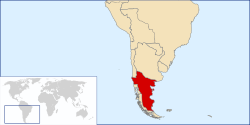Kingdom of Araucanía and Patagonia
| Kingdom of Araucanía and Patagonia | ||||||||||||||
| Reino de la Araucanía y la Patagonia | ||||||||||||||
| Unrecognized state | ||||||||||||||
|
||||||||||||||
|
||||||||||||||
|
Motto Spanish: Independencia y Libertad English: Independence and Liberty |
||||||||||||||
|
Location of the claimed territory of the Kingdom of Araucanía and Patagonia, in Chile and Argentina
|
||||||||||||||
| Capital | Perquenco, in current Cautín Province, La Araucanía Region, Chile | |||||||||||||
| Capital-in-exile | Paris, France | |||||||||||||
| Languages | Mapudungun, French and Spanish | |||||||||||||
| Government | Monarchy | |||||||||||||
| King | ||||||||||||||
| • | 1860–1878 | Orélie-Antoine I (Aurelio Antonio I) | ||||||||||||
| Historical era | Occupation of the Araucanía/Conquest of the Desert | |||||||||||||
| • | Established | 17 November 1860 | ||||||||||||
| • | Disestablished | 5 January 1862 | ||||||||||||
|
||||||||||||||
The Kingdom of Araucanía and Patagonia (Spanish: Reino de la Araucanía y de la Patagonia; French: Royaume d'Araucanie et de Patagonie, sometimes referred to as New France) was a proposed state and kingdom conceived in the 19th century by a French lawyer and adventurer named Orélie-Antoine de Tounens. Orélie-Antoine de Tounens claimed the regions of Araucanía and eastern Patagonia. It was an unrecognized state that enjoyed only marginal sovereignty in a brief period of time, through alliances with some Mapuche lonkos, in a reduced area of Araucanía, in current Chile.
At the time the local indigenous Mapuche population of Araucanía and Patagonia were engaged in a desperate armed struggle to retain their independence in the face of hostile military and economic encroachment by the governments of Chile and Argentina, who coveted the Mapuche lands for economical and political reasons. The successors of Orélie-Antoine all lived in France.
While visiting the region in 1860, Orélie-Antoine came to sympathise with the Mapuche cause, and a group of loncos (Mapuche tribal leaders) in turn elected him to the position of King —possibly in the belief that their cause might be better served with a European acting on their behalf. Orélie-Antoine then set about establishing a government in his capital of Perquenco, created a blue, white and green flag, and had coins minted for the nation under the name of Nouvelle France.
His efforts at securing international recognition for the Mapuche were thwarted by the Chilean and Argentinian governments, who captured, imprisoned and then deported him on several occasions. The supposed founding of the Kingdom of Araucanía and Patagonia led to the approval of the Occupation of Araucanía by Chilean forces. Chilean president José Joaquín Pérez authorized Cornelio Saavedra Rodríguez, commander of the Chilean troops invading Araucanía to capture Orélie-Antoine. He did not receive further punishment because he was deemed to be insane by both Chilean and Argentine authorities and sent to a madhouse in Chile. King Orélie-Antoine I eventually died penniless in France in 1878 after years of fruitless struggle to regain his perceived legitimate authority over his conquered kingdom. Historians Simon Collier and William F. Sater describe the Kingdom of Araucanía as a "curious and semi-comic episode".
...
Wikipedia



